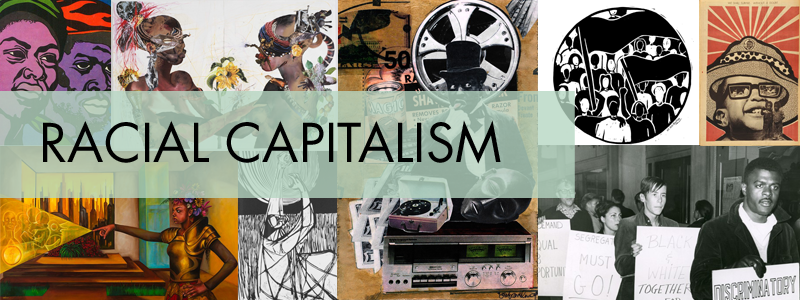Winter 2020
Special Event
Thursday, January 16th | 4:00 pm | Voorhies 126
Panel on Racial Capitalism and Finance Speakers: Emilie Connolly and Tamara Nopper
Emilie Connolly is a historian of Indigenous North America, the history of capitalism, and the 19th-century United States. Her book manuscript, “Fiduciary Colonialism: Indian Trust Funds and the Routes of American Capitalism,” examines how the federal government became both dispossessor of and trustee to the continent’s first peoples. The project argues that federal trusteeship, often cast as a benevolent practice, in fact advanced an imperial strategy named “fiduciary colonialism”: a form of territorial acquisition and population management carried out through the expansion of administrative control over Indigenous wealth.
Tamara K. Nopper’s teaching and research focuses on the intersection of economic, racial, and gender inequality, with a particular emphasis on entrepreneurship, banking, globalization, and urban development. Her publications have examined immigrant entrepreneurship, minority business development, the globalization of ethnic banking, and Asian American communities. Her current work looks at Korean immigrant entrepreneurship and post-Civil Rights era minority politics. She earned her Ph.D. in sociology at Temple University.
Special Event
Thursday, January 30th | 12:00 pm | Hart Hall 3201
Panel on Incarceration, Gender, and Resistance Speakers: Critical Resistance (Oakland Chapter) and Victoria Law
Victoria Law is a freelance journalist who focuses on the intersections of incarceration, gender and resistance. Her first book, Resistance Behind Bars: The Struggles of Incarcerated Women, examines organizing in women’s jails and prisons across the country. She writes regularly for Truthout and is a contributor to the anthology Who Do You Serve, Who Do You Protect? Her next book, co-written with Maya Schenwar, critically examines proposed “alternatives” to incarceration and explores creative and far-reaching solutions to truly end mass incarceration. She is also the proud parent of a New York City high school student.
Critical Resistance (CR) is a national grassroots organization building a movement to abolish the prison industrial complex (PIC). We think of the PIC as the system of surveillance, policing, and imprisonment that government, industry and their interests use as solutions to economic, social, and political problems.
Special Event
Monday, February 24th | 4:00 pm|Voorhies 126
Panel on Surveillance, Security, and Insurgent Aesthetics Speakers: Simone Browne and Ronak Kapadia
Simone Browne is a professor at the University of Texas at Austin. Her first book, Dark Matters: On the Surveillance of Blackness, examines surveillance with a focus on transatlantic slavery, biometrics, airports and creative texts.
Ronak K. Kapadia is Associate Professor of Gender and Women’s Studies and affiliated faculty in Art History, Global Asian Studies, and Museum & Exhibition Studies at the University of Illinois at Chicago. An interdisciplinary cultural theorist of race, security, sensation, and empire in the late 20th and early 21st century United States, Kapadia is author of Insurgent Aesthetics: Security and the Queer Life of the Forever War (Duke UP 2019). This book theorizes the world-making potential of contemporary artistic responses to US militarism in the Greater Middle East. Kapadia traces how new forms of remote killing, torture, confinement, and surveillance have created a distinctive post-9/11 infrastructure of racialized state violence. Linking these new forms of violence to the history of American imperialism and conquest, Kapadia shows how Arab, Muslim, and South Asian diasporic multimedia artists force a reckoning with the US War on Terror’s violent destruction and its impacts on immigrant and refugee communities.
Special Event
Friday, February 28th | 12:00 pm | Voorhies 126
Rojas with California Coalition for Women Prisoners and #MeTooBehindBars in discussion with Che Gossett on the #MeTooBehindBars Movement
Che Gossett is a trans femme writer, an archivist at the Barnard Center for Research on Women, and a PhD candidate intrans/gender studies at Rutgers. They will defend their dissertation in 2020. Che is the recipient of the 2014 Gloria E. Anzaldúa Award from the American Studies Association, a Radcliffe research grant from Harvard University, the 2014 Sylvia Rivera Award in Transgender Studies from the Center for Gay and Lesbian Studies at the City University of New York, and the 2014 Martin Duberman Research Scholar Award from the New York Public Library. Most recently, they received a Palestinian American Research Committee grant and are currently serving as a 2017-2018 Queer Arts Mentor. Che is working on a book project titled Blackness, the Beast and the Non Sovereign.
Rojas is an organizer with the California Coalition for Women Prisoners and the Young Women’s Freedom Center. Rojas was incarcerated for 15 years at the Central California Women’s Facility.
The MeToo movement has created important space for people, particularly women, to speak out about their experiences of sexual violations, harassment and assault. MeTooBehindBars is a campaign to expose the specific ways in which the prison system uses sexual and gender-based violence, including homophobia and transphobia, to target the people who it incarcerates and whose daily lives it has almost total control over. The campaign was launched in response to two assaults where correctional officers (COs) used physical force, sexual harassment, and homophobic and transphobic insults against transgender, gender non-conforming (GNC) and/or queer people at women’s prisons in California. The campaign supports a lawsuit filed against the CDCR by five plaintiffs who were targeted while at CCWF. #MeTooBehindBars is an attempt to expand the understanding of gender-based violence, sexual exploitation and harassment beyond specific incidences and as a systematic form of power and control enacted through institutions, legislation and the courts. Specifically, it exposes how women, transgender, gender non-conforming and queer people remain unprotected from daily harassment, humiliation, violence, deadly assault, disrespect, misogyny, homophobia and transphobia and how the system fails to hold accountable those who inflict these harms. MeTooBehindBars also aims to influence the MeToo movement, by encouraging models of transformative justice rather than expansions of the carceral system. It is part of initiatives to stop punishing women, transgender, gender non-conforming and queer people for the trauma, violence and exploitation we’ve experienced and the ways that we survive and defend ourselves, our children and our families.
